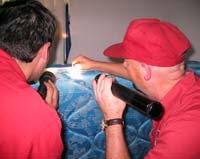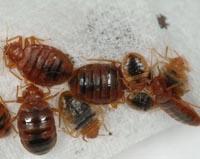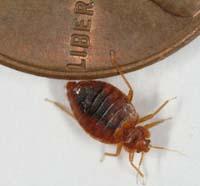Bedbugs Could Take Bite Out of Spring Break Fun
Bedbugs Could Take Bite Out of Spring Break Fun

To the hordes of young people heading out for spring break in the coming weeks, a word of caution: Don’t let the bedbugs bite!
After 50-plus years of near extinction in the United States, the vampire-like pests made famous in a children’s nursery rhyme are back. And the chances of an encounter – no matter the travel destination – are increasing, said Michael Potter, entomologist at the University of Kentucky College of Agriculture.
“It’s still an infrequent problem,” Potter said, “… but spring breakers, their families – all travelers – need to understand it is a possibility there will be bedbugs in their hotel room, hostel or wherever they happen to be staying. Any overnight lodging is fair game.”  Potter should know. His research on bedbugs and his collaboration with the pest control industry have made him a much sought-after expert on the tiny insects, which emerge at night and bite people while they’re sleeping. Potter calls bedbugs the “hottest pest issue in a generation.”
Potter should know. His research on bedbugs and his collaboration with the pest control industry have made him a much sought-after expert on the tiny insects, which emerge at night and bite people while they’re sleeping. Potter calls bedbugs the “hottest pest issue in a generation.”
“The problem is continuing to escalate, which means people really need to be vigilant,” he said. “Being informed is a way to minimize the chances of becoming a midnight snack and bringing them home in your belongings. Besides being bloodsuckers, bedbugs are amazing hitchhikers and can easily be transported home in a suitcase.”
The first – and most important – thing Potter recommends is a visual examination of all beds. There are many places bedbugs can hide, but the best and easiest place to find them is at “ground zero.”
“Pull back the bed sheets at least on the upper half of the bed and examine the seams of the mattress and box spring, especially along the upper corners and the pillow area. … Bedbugs especially like seams and tufts and folds,” Potter said. “If they really want to be thorough, they should check the lower half of the bed also.”
While conducting a bed check, look for the bedbugs themselves – brown, oval-shaped insects that, when mature, are about the size of a tick – as well as for the telltale dark spotting or speckling from digested blood. As a bedbug infestation becomes larger, it spreads outward from the bed. So, for those who want to conduct a more comprehensive search for bedbugs, Potter recommends looking in seams, folds and tufts of couches and chairs and along carpet edges near baseboards. The corners and edges where the ceiling meets the walls are also popular bedbug hiding spots.
As a bedbug infestation becomes larger, it spreads outward from the bed. So, for those who want to conduct a more comprehensive search for bedbugs, Potter recommends looking in seams, folds and tufts of couches and chairs and along carpet edges near baseboards. The corners and edges where the ceiling meets the walls are also popular bedbug hiding spots.
“Vacationers concerned about bedbugs should check before they unpack their suitcases,” Potter said.
If there are signs of a bedbug infestation, he recommends telling the management that you want a different room – and not one next door to the one that is infested.
“Bedbugs can move laterally from one room to another as well as to the room above or below,” he said. “When you move to another room, you should go through and check (for bedbugs) again.”
If your inspection yields no signs of bedbugs, but a day or two later you notice itchy, raised, mosquito-like welts on your body, “that’s suspicious,” Potter said. “It’s not a guarantee it’s bedbugs, but it may warrant a detailed inspection by a pest control expert – and a request for another room. “
Regardless of whether you find evidence of bedbugs, if you suspect the room where you slept was infested you may want to take further precautions upon returning home, including bagging and laundering all your clothing and, perhaps, even disposing of your suitcase.
“Determining whether a bedbug has crawled into someone’s suitcase is extremely difficult,” Potter said, “as they’re likely to remain hidden beneath the inner liner or within cracks or crevices.”
While bedbugs have never been shown to transmit human diseases, Potter admits “they are very, very emotionally disturbing.” And while the hospitality industry is becoming increasingly aware of the problem, he said it’s prudent to be on guard when traveling.
“You have to understand these are cryptic, hard-to-find critters. The best form of prevention is doing a bed check initially before unpacking your bag,” he said.
